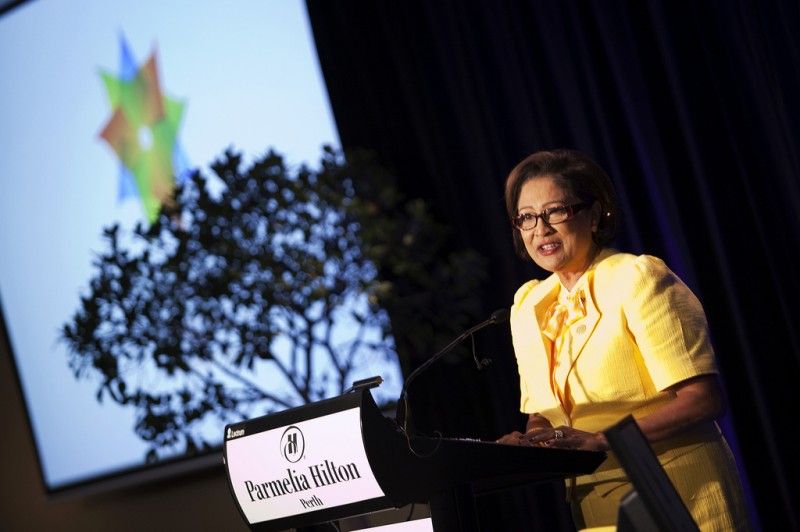
The Hon Kamla Persad Bissessar; photo © Brooke Miles / Commonwealth Foundation, used under a CC BY-NC-ND 2.0 license.
Are politicians cashing in on Christmas? In Trinidad and Tobago, it appears — at least to some netizens — that the ruling party may be riding on Christmas’ coattails in a bid to generate some goodwill and warm feelings and, more importantly, translate them into votes come the country's general elections in 2015.
From early December, Prime Minister Kamla Persad-Bissessar's Facebook page was chock-full of posts showing the country's leader traveling around the twin island republic on what has been officially called her Holiday Toy Drive. There were giveaways in the oft-forgotten sister isle of Tobago; in Couva, a traditional stronghold constituency for the ruling party; and in Arima and St. Joseph, the former an opposition-held voting area and the other a key seat for swing votes, both in the east of the country. But the many photo opportunities of a smiling leader, giving things away like Santa Claus while the country grapples with debilitating levels of crime and a precarious economic future based on the plummeting price of oil, has many social media users concerned.
Public relations expert-turned-blogger Dennise Demming kept thinking about the aftermath of all this spending:
Lurking in the shadows of my mind is the nagging question: What will it be like in January?
2014 will be remembered as the year of giveaway and freeness. Come 2015, the pensioners will have spent their extra $5,000.00 Christmas gift; the prices of staples would have crept up beyond their pre-Christmas-gift level; the price of oil and gas would be even lower and the ‘Kamla promotional giveaways’ would be laying around the house.
Putting her marketing acumen to work, Demming continued:
The Communication Gurus behind the UNC’s [the United National Congress, the main political party which forms the current coalition government] political campaign have invested their entire spend in the notion that good brand visibility signifies the ability of your products/services to attract the attention of your target audience and therefore stimulate re-sale. In this case, the feeling is that the more you see of the Prime Minister and the UNC, the more likely you are to vote for them at the appointed hour. The literature also suggests that there is a saturation point – that point at which the audience becomes numb to the message. There is no formula to prescribe that point. The decision is informed by data and a good dose of common sense. All that is happening in this Yuletide season can be summed up as ‘voter inducement’ and the society is paying a significant price.
Even mainstream media took notice and started to ask questions. Newspaper columnist Raffique Shah spoke of “the overnight appearance of billboards bearing the Santa-ific images of our esteemed Prime Minister, erected along the highways, wishing the nation a happy Christmas”:
There are several irregularities hovering over these billboards […] Communications Minister Vasant Bharath said they cost $60,000, small change really for today’s politicians. Fine. But who paid for them? Were they Government-funded, corporate-sponsored, or mysteriously materialised by hands as unseen as those that produced toys by the tonnes? The answer to these questions is of material interest to the nation. If it was public funds used, who authorised the expenditure, from what ministry?
Billboards were not the only aspect of the Christmas campaign, however — the prime minister's image also adorned gift bags and Facebook greetings. It was only a matter of time before the memes started. This one compared Persad-Bissessar's political approach with that of other global leaders, with the caption “Fine company to be in”:

One Facebook user, Rhoda Bharath, linked to U.S. President Barack Obama's holiday message and quipped:
No nationwide Billboard programme was harmed in sending these wishes.
In contrast, there were many commenters on the Prime Minister's Facebook page who approved of the giveaways. Some said she was doing a good job, others thought the toy drive was a kind gesture, and one commenter said that “the truth will not be told at the polls , but when these kids grow up and do the same for others.”
In terms of how the campaign was funded however, Dennise Demming was not impressed with the level of transparency displayed by the prime minister:
First the lady did not know where the toys or media gifts came from; then she didn’t know that there was money and food vouchers in the media gifts. Eventually sources revealed that some manufacturers provided the gifts and significant discounts. That’s good, except for the fact that the companies all manufacture foods, beverages and other consumables. The question remains, who imported the toys and at what cost? Were State funds utilised? Should the Government be accepting gifts from unknown donors? In any ‘two bit’ company you are required to operate within the boundaries of the gifting policy and for good reason. There would also be a register so that gifts would be recorded and known to all. Where is the transparency and accountability?
She ended her post with more questions than answers:
After the dust settles on the 2015 general elections some leader will be responsible for changing the way we do business in T&T and that culture change is probably the single biggest headache that will be experienced for years to come.
How will we move away from an attitude of entitlement? How will we recalibrate the society into remembering that work precedes success? How will we get our leaders to live the value that people do what you do and not what you say? How will we inspire our people to give a fair days work for their pay?
These are complicated questions with no silver bullet answers. Our single assurance is that these questions must be answered and provision made to ensure that they are answered in a way that will benefit our society.







1 comment